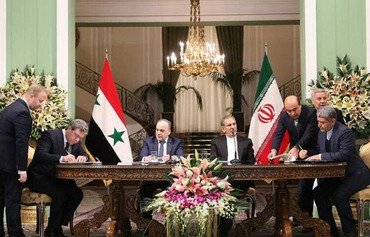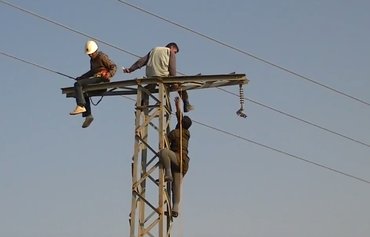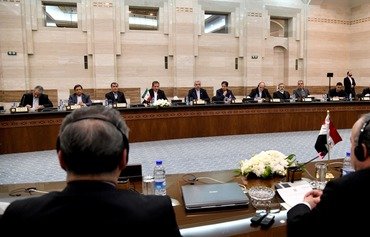Iran is seeking to expand its influence in Syria through economic channels, augmenting its efforts to wield military influence via its Islamic Revolutionary Guard Corps (IRGC) and affiliated militias, economists told Diyaruna.
This growing economic control poses a serious threat to Syria and Syrians, they said, as the Iranian regime now has its fingers in all of the war-torn country's economic, investment and financial sectors.
When the conflict comes to its eventual conclusion, they warned, it may be impossible to disengage the relationship between the two countries, and that would spell disaster for the Syrian economy over the long term.
" Iran’s project aimed at the establishment of a ‘useful Syria’ is indeed useful, though not for Syria but Iran itself," said Syrian lawyer Bashir al-Bassam, who resides in Cairo.
"Anyone who observes the Iranian financial, economic and investment expansion in Syria would clearly see that a plan is in place to seize control of Syria’s economic resources," he told Diyaruna.
This is not limited to the construction companies that have recently emerged as participants in the process of rebuilding the areas surrounding cities such as Damascus and Homs, he said, but extends to most investment avenues.
For instance, IRGC-owned companies currently control most electricity sources in Syria, said Ain Shams University economics professor Shaher Abdullah.
These companies are in the process of installing generators and hydraulic and natural gas powered electricity generation stations throughout Syria, he said, as well as electricity pylons and high voltage towers, and even usage meters and wooden electricity poles.
Power stations that have been fully equipped by such Iranian companies include the Jandar 2, Jandar 3 and Tishrin power stations, Abdullah said.
Iranian monopolies in sectors like electricity will complicate matters once the war is over.
IRGC companies
"The majority of the large number of Iranian companies operating within Iran and abroad, and especially in Syria, are controlled by the IRGC, which operates as a holding company," Abdullah said.
These companies, operating under various names, conceal what is really transpiring and ensure the proliferation of Iranian influence, he explained.
The most prominent IRGC-controlled companies include the Telecommunications Company of Iran and the Kargoshaee Bank, Future Bank B.S.C., Arian Bank, Bank Melli Iran, Mehr Bank and Ansar Bank in the banking sector, he said.
In the construction sector, the Khatam al-Anbiya Construction Base conglomerate controls the majority of companies operating in Syria, he added.
In the transport and aviation sectors, prominent Iranian companies include Yas Air and Aban Air, he said. In the engine and automotive sector, the IRGC increased its ownership share in the Khodro Automobile Manufacturing Company after selling its shares in the Bahman Group to evade international sanctions.
As for the oil, natural gas and energy agreements signed with Syria, "they too pass through companies controlled by the IRGC, including the National Iranian Oil Company, Pars Oil and Gas Company, Shiraz Petrochemical Company and Kermanshah Petrochemical Industries Co., Abdullah said.
Leverage
On the surface, Iranian investments in Syria appear to the casual observer as "ordinary commercial investment activities", said Cairo University doctoral student Sheyar Turko, who has been researching the financing of the IRGC.
The joint Syrian-Iranian Committee, Joint Businessmen Council and other media fronts give these activities cover, he told Diyaruna, and suggest that everything is being conducted through businessmen and investor groups.
But the truth goes beyond that, he said.
Iran has sought -- especially since the outbreak of the Syrian war -- to support the Syrian regime with loans and grants to offset the country's economic losses, he said, noting that every loan comes at a price.
"For example, in exchange for the $3.6 billion loan Damascus received, Tehran obtained Syrian approval for the entry of dozens of [Iranian] companies into various sectors of the Syrian market, including currency exchange companies," he said.
'Useful Syria' expansion
The Iranian project in Syria includes forming a residential belt around Alawite-majority areas controlled by the ruling regime in Damascus, lawyer al-Bassam said.
Some residential sections in those areas have been completed and Iranian, Lebanese, Afghan and Syrian civilians have been housed in them, he added.
"Rami Makhlouf, a relative of the Syrian President, sought some time ago through his real estate companies to acquire most enterprises operating in the areas of Damascus, al-Qalamoun and Ghouta, where confirmed reports indicate that a number of Syrian businessmen, including Abdul Kader Sabra and Ayman Jaber, have stakes in some of Makhlouf’s companies," al-Bassam said.
Companies operating in those areas in which Makhlouf is a majority shareholder include Sorouh, al-Fajr, al-Batraa, al-Hadaiq, Bunyan al-Sham, RAC and Ramak.
"These companies acquired all real estate properties in those areas from their original owners in a variety of ways," al-Bassam said.
"Areas were completely vacated of residents belonging to the Sunni sect," he said, "and all who live in that [residential] belt now are from the Alawite and Shia sects, and specifically Shias loyal to the Wali al-Faqih to ensure full loyalty to the Iranian project in Syria."
"Makhlouf established partnerships with Iranian companies, most notably IRGC-owned Khatam al-Anbiya, which is allocating work to some smaller Iranian companies affiliated with the parent company," al-Bassam said.
This turned these areas into "a hive swarming with Iranians", including Iranian and Afghan labourers brought in to work at these sites, he said.
Even the guards in those areas belong to militias directly affiliated with the IRGC, he said, especially the Lebanese Hizbullah militia which "apparently got its share of the residential areas to house a number of its fighters who were brought in from Lebanon".
These ongoing activities "will, of course, change Syria's cultural and demographic makeup with the removal of a key component of the Syrian population", al-Bassam said.
"Those regions, like other areas of Syria, had mixed populations of Alawites and Sunnis and had witnessed a renaissance over the decades because of this mix," he said.
"Now, however, the situation can be summed up by saying that Damascus of the future will be protected by walls of residential complexes housing one component" while keeping the other components out, he said.

![Syrians work at a construction site in Damascus in March 2007. Areas in Damascus, Ghouta and al-Qalamoun are completely being vacated of residents belonging to the Sunni sect as part of the Iranian project in Syria. [Louai Beshara/AFP]](/cnmi_di/images/2016/12/12/6756-syria-damascus-construction-600_384.jpg)







Soon only SDF region will be free of Turkish, Iranian and Russian dominance. Reconstruction there is by locals, by local companies. Sure, USA is donating some heavy equipment, but all plans, work, is done by locals. No big company or bureacrat is getting bigger or fatter from the effeorts of locals to rebuild their homes, their cities, their economies.people are fleeing from Assadistan to NES, where they are welcome if they can fit in.
Reply4 Comment(s)
Syria should be very happy about the fact that the IRGC is helping them out! Syria wasn't even able to resist the enemy. How can it possibly rebuild its economy? You must consider yourselves extremely lucky that the IRGC is rebuilding the ruins of Syria.
ReplySDF region is very happy not to have Iranians. They prefer to do the job themselves.
Reply4 Comment(s)
Once an Iraqi prisoner of war who returned from Iran said to me, “After 18 years in captivity, I knew that the Iranian regime thinks in a modern, contemporary way, unlike what the ignorant people and losers think. Politicians there have a strategy for looking for markets, exports and production, like western countries. They don’t care too much about religious issues, until they meet some Arabs, especially Iraqis, Syrians and Lebanese!!”
Reply4 Comment(s)